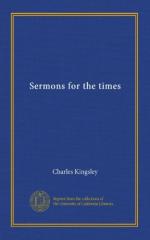Now says St. Paul, ’Covet earnestly the best gifts: and yet show I you a more excellent way;’ and that is charity; love. As much as to say, I do not complain of any of you for trying to be the best that you can, for trying to be as wise as you can be, as eloquent as you can be, as learned as you can be: I do not complain of you for trying to rise; but I do complain of you for trying to rise upon each other’s shoulders. I do complain of you for each trying to set up himself, and trying to make use of his neighbours instead of helping them; and, when God gives you gifts to do good to others with, trying to do good only to yourselves with them.
For he says, you are all members of one body; and all the talents, gifts, understanding, power, money, which God has bestowed on you, He has given you only that you may help your neighbours with them. Of course there is no harm in longing and praying for great gifts, longing and praying to be very wise, or very eloquent; but only that you may do all the more good. And, after all, says St. Paul, there is something more worth longing for, not merely than money, but more worth longing for than the wisdom of a prophet, or the tongue of an angel; and that is charity. If you have that, you will be able to do as much good as God requires of you in your station; and if you have not that, you will not do what God requires of you, even though you spoke with the tongues of men and of angels. Even though you had the gift of prophecy, and understood all mysteries, and all knowledge; even though you had all faith, so that you could remove mountains; even though you had all good works, and gave all your goods to feed the poor, and your body to be burned as a martyr for the sake of religion, and had not charity, you would




